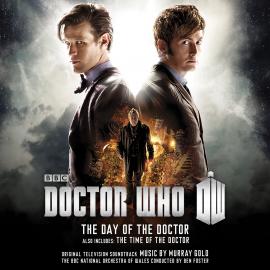The Day of the Doctor / The Time of the Doctor - OST
Monday, 24 November 2014 - Reviewed by
 The Day of the Doctor / The Time of the Doctor
The Day of the Doctor / The Time of the DoctorMusic by Murray Gold
The BBC National Orchestra of Wales
Conducted by Ben Foster
Silva Screen Records
24 November 2014
Available to order now from Amazon UK
Looking backwards as well as forwards, Murray Gold’s score to The Day of the Doctor represents a culmination of the entirety of the revival-era of the show. Surprised by callbacks in the score, in ‘Nice Horse’ the cue opens with woodwind timbres evocative of Geoffrey Burgon as the Zygons are revealed. With greater use of synthetic elements throughout, there are a few calls back to the Radiophonic Workshop era, especially during ‘We are the Doctors’, ‘The Moment has Come’ and the ‘Song for Four’ that closes the story. For aficionados of leitmotivic film scores, Murray Gold delivers a rich thematic world for the Doctor. As war rages over the second city of Arcadia, strains of Gold’s ‘This is Gallifrey: Our Childhood, Our Home’ from Series 3 can be heard punctuating the battle by the low brass. In addition to the thematic material representing the 10th and 11th Doctors, John Hurt’s War Doctor is represented by music associated with Christopher Eccleston’s damaged 9th Doctor. The use of U.N.I.T.’s theme from Series 1 is balanced well against music evocative of political espionage films, filled with electronic elements and suspenseful repetitive string ostinati. The theme for the Moment in ‘Who are You’ and ‘The Moment has Come’ incorporates elements from Rose’s piano theme from Series 1 as well as the novel use of reverse delay on piano and clarinet, a technique that Gold used to great effect in the Series 5 stories The Pandorica Opens and The Big Bang. The only unsettling or controversial moment in the score is during the pivotal ‘The Moment has Come’ in which the Doctor struggles whether to deploy the ultimate weapon of mass destruction. Here, the music is filled with Middle-Eastern timbres, scales and microtonality punctuated by the icy timbre of the hammered dulcimer. A musical association between the story’s subtext of genocide and real-world violence is likely not intended, but does resonate beyond the score and the world of the fiction. Perhaps this encapsulates the strength of this score where popular music elements, electronic timbres, symphonic timbres, and non-Western timbres coexist in a series whose messages are primarily inclusiveness and pacifism.
While the cues ‘He Was There’, ‘No More’ and ‘The War Room’ are among the most exciting cues on the release, it is unusual that ‘He Was There’ differs from the transmission version omitting the choral elements - an interesting album variation. The closing ‘Song for Four/ Home’ is interesting in that it represents Murray Gold’s original intentions differing significantly from the transmission version of The Day of the Doctor. I, for one, would have enjoyed hearing both versions on this release, perhaps including the transmission version as bonus tracks on the second disk. The absence of Gold’s arrangement of Ron Grainer’s theme that closed The Day of the Doctor, however, is puzzling but understandable if there were licensing issues with Ron Grainer’s theme through his publisher Erle Music/Warner Chappell. It is important to note that the Doctor Who theme, existing in various re-orchestrations by Murray Gold, have not been included in Silva Screen releases of Murray Gold’s scores since Series 5. The omitted opening theme, as realized by Delia Derbyshire, is still available on a variety of recent Silva Screen releases.
Despite these relatively minor criticisms, The Day of the Doctor remains an excellent release, if only slightly imperfect. The Time of the Doctor, however, succeeds a great deal in presenting a very different and cohesive musical narrative - marvelously balanced with the transformation of Gold’s ‘I Am the Doctor’ into a Christmas call-to-arms. The inclusion of sleigh bells, glockenspiel and celeste only enhances this magical Christmas-parable, filled with Ben Foster’s lush and cinematic orchestrations, with a sound mix favouring the low strings. The Time of the Doctor‘s score feels more intimate and personal, mirroring its sensitive and sentimental story. The differences between the constancy of The Time of the Doctor and the bolder experimentalism and scope of The Day of the Doctor makes for a multi-layered experience with its contrast set to 11 – offering many rewards upon repeat listens.
Highly Recommended. Rating 10/11
Dr. Phillip Serna is co-host of the Adventures in Time, Space and Music podcast.







